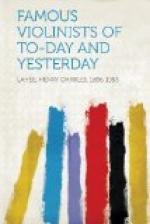He enjoyed conversation when he was in the company of a small circle of friends. He was cheerful at evening parties,—if music was not mentioned. He had an excellent memory for features and names of persons whom he had met, but it is said that he never remembered the names of towns at which he had given concerts. He was very severe with orchestras, and any mistakes made by them would bring forth a tempest of rage, though satisfactory work would be rewarded with expressions of approval. When he came to a pause for the introduction of a cadenza, at rehearsal, the musicians would frequently rise, eager to watch his performance, but Paganini would merely play a few notes, and then stopping suddenly would smile and say, “Et cetera, messieurs!” and reserve his strength for the public performance.
His peculiarities were shown strongly in his arrangements for personal comfort while travelling, for his constant suffering precluded the enjoyment of the beauties of nature. He was always cold, and even in summer kept a large cloak wrapped around him, and the windows of the carriage carefully closed. Before starting he took merely a basin of soup or a cup of chocolate, and though he frequently remained nearly the whole day without further refreshment, he slept a great deal and thus escaped some of the pain which the jolting of the carriage caused him. His luggage consisted of a small dilapidated trunk, which contained his violin, his jewels, his money, and a few fine linen articles. Besides this he had only a hat-case and a carpet-bag, and frequently a napkin would contain his entire wardrobe. In a small red pocketbook he kept his accounts and his papers, which represented an immense value, and nobody but himself could decipher the hieroglyphics which indicated his expenses and receipts. He cared not whether his apartment, at the inns on the road, was elegantly furnished or a mere garret, but he always kept the windows open in order to get an “air-bath,” contrary to his custom while in a carriage.
While the secret of Paganini’s marvellous technique was incessant hard work, to which he was urged not less by his own ambition than by his father’s cruelty, yet in later years he seldom practised, and his playing was chiefly confined to his concerts and rehearsals. There are several good stories dealing with this peculiarity. One man is said to have followed him around for months, taking the adjoining room at hotels, in order to find the secret of his success by hearing him practise. Once, when looking through the keyhole, he saw the virtuoso go to the violin case, take out the instrument, and after seeing that it was in tune,—put it back again.




